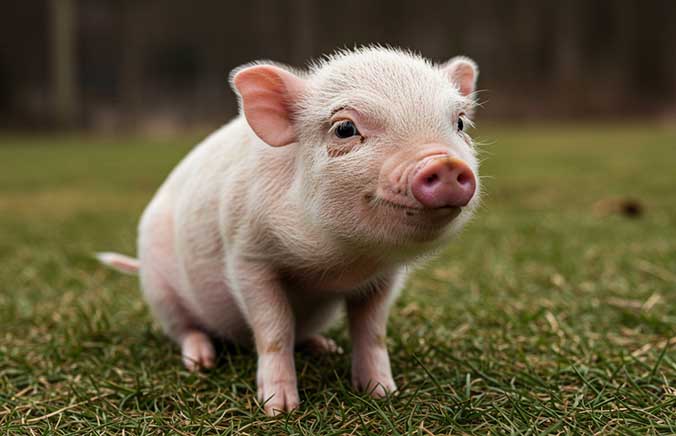Mini pigs — micro pigs or teacup pigs — have become increasingly popular among pet lovers looking for something out of the ordinary. Their small size, intelligence, and endearing personalities make them seem perfect pets. But before you bring one of these little oinkers home, there are several essential factors you need to understand. Let’s explore everything you should know before adopting a mini pig.
What Exactly Is a Mini Pig?
Despite the name, “mini” pigs aren’t always tiny. The term “mini pig” refers to a variety of smaller domestic pig breeds, including the Juliana, Göttingen, and pot-bellied pigs. When fully grown, they can weigh between 70 and 150 pounds — significantly more than people expect based on the term “teacup.”
Many breeders mislead potential owners by showcasing young piglets and underfeeding adults to maintain a smaller appearance. That’s why understanding the true size and needs of a mini pig is critical before making a lifelong commitment.
The Truth About Size and Growth
Pigs grow slowly and don’t reach their full size until they’re about 3 to 5 years old. That adorable 15-pound piglet might eventually grow into a 120-pound adult. It’s important to be prepared for the real size and space requirements of a fully grown pig.
Many pigs end up in rescue shelters simply because owners weren’t prepared for how large they would become. Proper research and speaking with reputable breeders or exotic veterinarians can help you avoid unexpected surprises.
Legal Considerations and Zoning Laws
Before bringing a mini pig home, check your local laws and regulations. Many cities and housing developments have strict rules against keeping pigs as pets due to zoning laws or homeowners’ association guidelines.
Some places consider pigs as livestock rather than pets, even if they are house-trained and live indoors. Violating these regulations can result in fines or even removal of your pet.
Always consult with your municipality and confirm whether pigs are legally allowed before making any commitment.
Are Mini Pigs Clean?
Contrary to popular belief, pigs are incredibly clean animals. They naturally avoid soiling their sleeping areas and can be easily litter trained — often more quickly than a dog or cat.
Mini pigs also don’t shed fur or have dander, making them hypoallergenic in many cases. However, they do love to root and dig, so providing a designated space for these behaviors is essential to protect your furniture and yard.
Social Behavior and Intelligence
Mini pigs are among the smartest animals you can have as a pet. They can be trained to follow commands, use a litter box, walk on a leash, and even perform tricks. Their intelligence, however, means they need mental stimulation.
Without proper engagement, they may become bored, destructive, or even depressed. Puzzle toys, training sessions, and social interaction are necessary to keep them happy and healthy.
Additionally, pigs are social animals and may get lonely if left alone for long periods. Some owners choose to adopt two pigs together or ensure their pig has daily companionship.
What Do Mini Pigs Eat?
A balanced diet is essential for mini pigs. Commercial pig pellets designed specifically for mini pigs are the best foundation, but they should be supplemented with fresh vegetables, fruits, and grains. Avoid processed human foods, as pigs are prone to obesity and digestive issues.
Pigs require ample fiber in their diets, and overfeeding can lead to joint problems, liver disease, and shortened lifespan. Always consult a veterinarian with experience in pig care for specific dietary guidance.
Habitat and Living Space
Mini pigs can adapt to indoor living, but they require space to roam, root, and explore. They are not ideal pets for small apartments or homes with no outdoor access.
Ideally, pigs should have:
- A warm, dry indoor space with soft bedding
- Access to a secure outdoor area for play and rooting
- Enrichment toys and digging boxes
- Shade and shelter when outdoors
- Protection from extreme temperatures
Pigs are sensitive to both heat and cold. In hot climates, they are at risk for overheating and require shade and water to wallow in. In colder areas, they need blankets and possibly indoor heating to stay comfortable.
Health Care and Veterinary Support
Finding a veterinarian who is experienced with pigs can be a challenge. Mini pigs require routine checkups, vaccinations, and hoof and tusk trims.
Spaying or neutering is also recommended. It helps manage behavioral issues and prevents potential health complications. Female pigs, in particular, can develop uterine tumors if not spayed.
Common health issues in mini pigs include:
- Obesity
- Arthritis
- Skin dryness or mange
- Overgrown hooves or tusks
- Vitamin deficiencies
A proper healthcare plan should be in place before you bring a pig home.
Training and Behavior
Mini pigs respond well to positive reinforcement training. Use treats and praise to teach them commands, crate training, or leash walking.
However, pigs can be stubborn and independent. They need consistent boundaries and early training to ensure good behavior. Harsh discipline or yelling does not work and can damage your bond.
Pigs may also display dominant behavior if not trained properly. Establish yourself as the consistent and kind leader from the beginning.
Common Misconceptions About Mini Pigs
Many prospective owners fall victim to myths that can lead to disappointment or rehoming:
Myth 1: Mini pigs will stay small forever
Fact: Most will grow to at least 70–150 pounds as adults.
Myth 2: They’re just like dogs
Fact: While affectionate and smart, pigs are very different and require unique care and patience.
Myth 3: Any vet can treat them
Fact: Pigs need specialized veterinary care, and not all clinics are equipped for them.
Myth 4: They don’t need much space
Fact: Mini pigs need both indoor and outdoor space to thrive.
Pros and Cons of Having a Mini Pig
Here’s a quick look at the main pros and cons:
Pros:
- Intelligent and trainable
- Affectionate and loyal
- Hypoallergenic
- Long lifespan (up to 15–20 years)
- Clean and odor-free with proper care
Cons:
- Require specific diet and medical care
- Can become large and heavy
- Not always legal in urban areas
- Need social interaction and mental stimulation
- May damage furniture or dig in the yard
Is a Mini Pig Right for You?
Adopting a mini pig is not a decision to be taken lightly. They are adorable, social, and smart animals — but they are also demanding and long-term commitments.
If you have the space, time, budget, and passion to care for one properly, a mini pig can be a delightful addition to your family. But if you’re looking for a low-maintenance or temporary pet, consider another option.
A Pet That Requires Respect
Mini pigs are often misunderstood, marketed as ultra-small, trendy pets. In reality, they are intelligent animals that deserve the same respect and preparation as any other companion.
Understanding their true nature, needs, and legal status is the first step toward being a responsible pig parent. If done right, raising a mini pig can be a joyful, humorous, and loving experience — one filled with snorts, squeals, and unforgettable moments.

I specialize in transforming homes into pet havens. I offer practical tips on creating safe environments, selecting stimulating toys, designing enriching spaces for pets, risk prevention strategies and daily care routines that prioritize animal well-being. Discover science-based solutions for happier, healthier companions.

